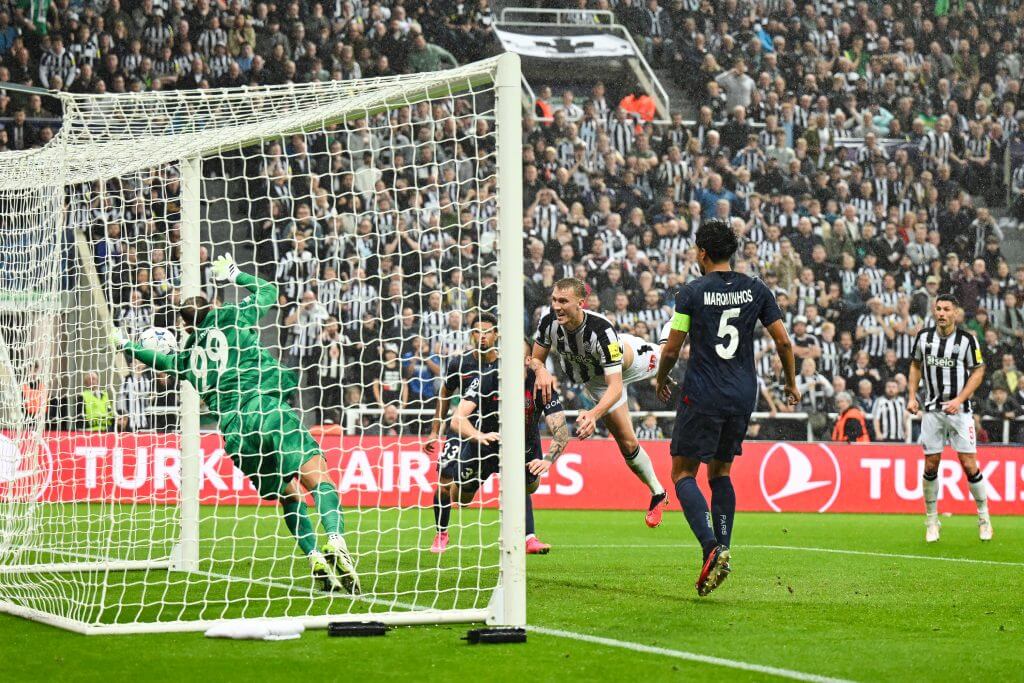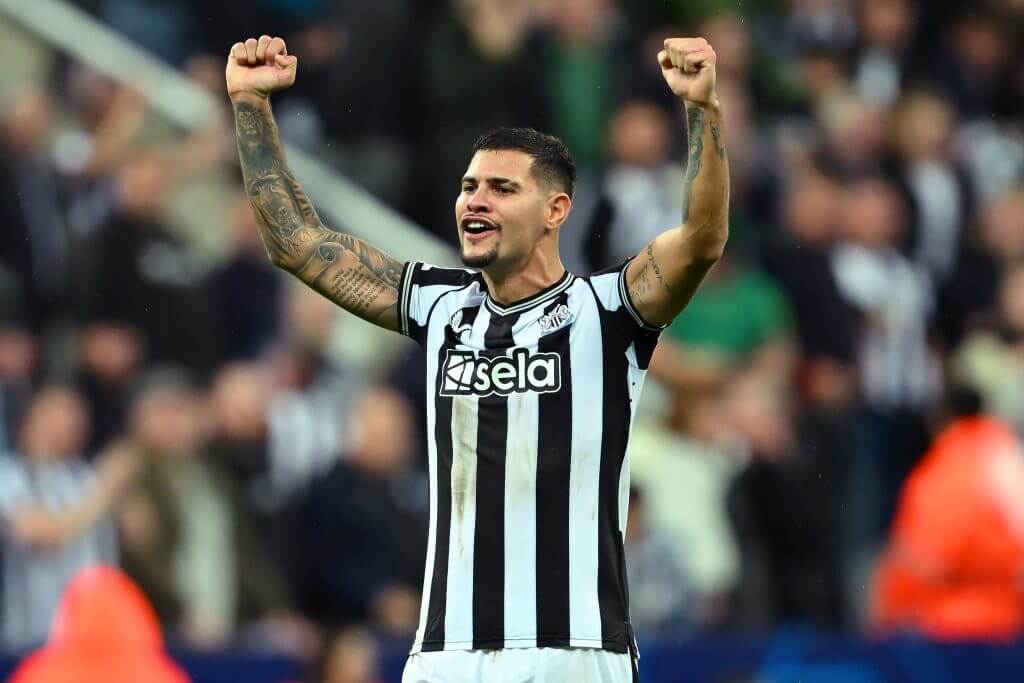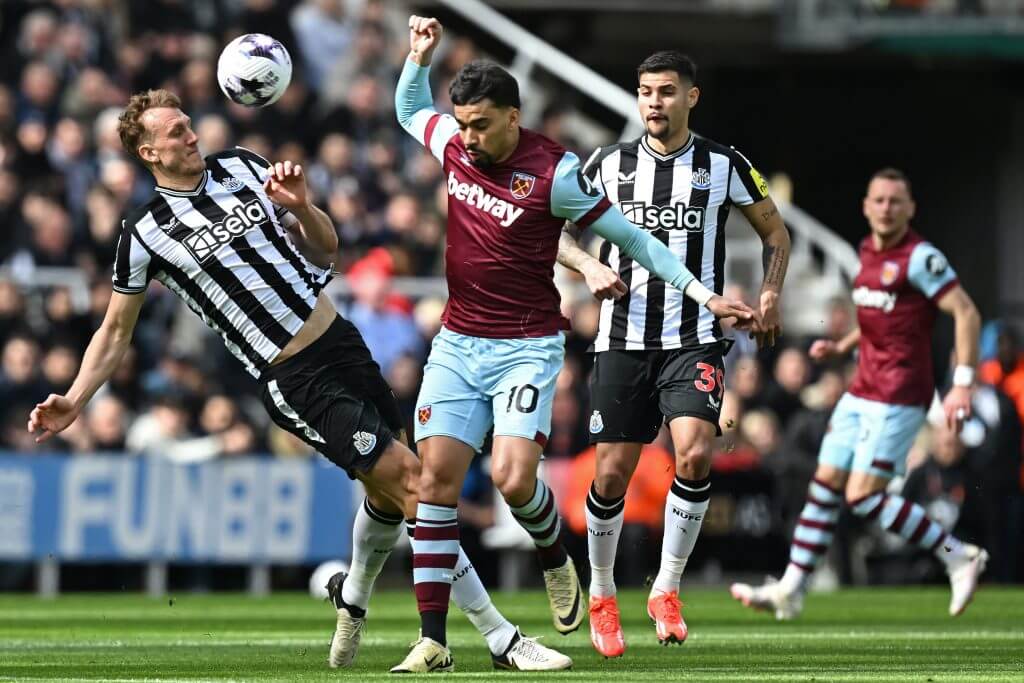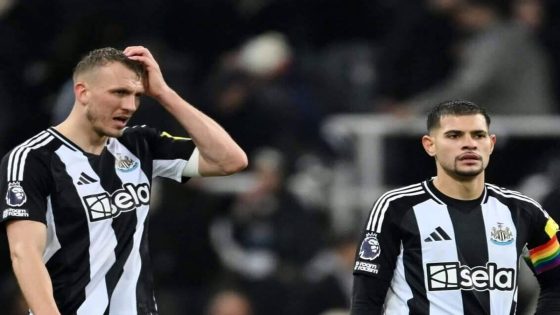There were significant milestones for two Newcastle United players in that fizzing, feisty 3-3 draw with Liverpool the other night, both powerful, personal stories and both indicators about where things stand at St James’ Park. Under the lights, as the crowd bayed and boiled, Dan Burn and Bruno Guimaraes gritted and glittered their way to 100 Premier League appearances for the club, both men fundamental and brilliant, revelling in this extra time.
In another, not-too-distant world and for very different reasons, neither Burn nor Guimaraes would be at Newcastle any longer. The two men arrived on Tyneside in January 2022 when the bottom three was a cold, clammy companion, Burn a pragmatic addition from Brighton & Hove Albion, Guimaraes the sole glimpse of a shimmering future to be signed that month. The aim: to get Newcastle where they needed to be. The reality: still here, still not there.
In Burn’s case, the challenge was remedial. The previous month, over consecutive matches, Newcastle had lost 4-0 at Leicester City, conceded three goals at Anfield and been spanked 4-0 at home to Manchester City. They were leaky and flaky. They needed a lifeboat, they needed a miracle, but a centre-half would have to do. They had a handful of targets and Burn was not one of them. That shortlist became a no-list.
When Newcastle’s takeover was finally ratified, Burn had given up on his boyhood dream of playing for the club. He was 29 and popular at Brighton & Hove Albion but not quite integral. A roll-call of his previous postings was unremarkable; Wigan Athletic, Birmingham City, Yeovil Town, Fulham, Darlington. Champions League? What a giggle, not that Newcastle were laughing. Their focus was on the Championship and how to avoid it.
Burn’s arrival was a “strange one,” says a senior first-team source, granted anonymity in order to speak candidly about club strategy, “because he wasn’t on our initial list and we were trying to force an idea: ‘Come on, what can we do?’ Some players we missed out on, others just didn’t feel right and somehow we got to Dan and the Geordie part just swung it to an an absolute yes, especially in that moment when we were fighting to stay in the league. It was character. It was about people who were motivated.”

Burn cost £13million ($16.5m at current rates), which felt like a decent deal for Brighton and dead money for Newcastle. It was needs-must. In an early (lovely) interview with The Athletic’s Chris Waugh, Burn acknowledged that people were dismissing him as a “stop-gap,” signing and promised to “prove that I can be here and stay along for as much of the ride as possible”. But if Newcastle progressed in the way they intended, it would not, could not be a long-term proposition.
Nearly three years on, Burn is a warrior. He has appeared in a cup final for Newcastle, he has scored in the Champions League, he has played with broken bones in his back, he has squeezed every ounce from himself, risen with the team and given himself to it, filling in at left-back, making it his own and then fixing himself at centre-half. Against Liverpool on Wednesday, he wrestled and bested Darwin Nunez. He is towering and inspirational. He is a fine, fine player and too precious to write off.
Turns out, that £13m was not dead. It writhed with life. It is up there with the best value for money in Newcastle’s modern history. And if Burn’s arrival was unexpected, then so has been his staying. In terms of his career, he is not a young man, but he plays with the exuberance of a debutant, a fan — look at him fist-pumping at Guimaraes finally winning a pre-match coin-toss against Liverpool! — and with the deadly grip of a man refusing to let go. Each game could be his first or last.
“Unbelievable,” is how the first-team source describes Burn’s impact, whether on the pitch or off it, where he is a founding member of Newcastle’s “leadership group” and now an ambassador for the club’s charitable foundation. “He’s been an incredible signing for me and much better than I had hoped,” Howe told reporters earlier this year. Over the last couple of games, Howe has called Burn “gigantic” — true in more ways than one — and “outstanding.”
Guimaraes is a different case, a different player, although the Brazil international, a skilful, emotional tempo-setter, shares characteristics with Burn, beyond overt passion and availability. He, too, was being singled out for departure not long after he joined, with Newcastle quickly recognising that the midfielder’s development might outstrip theirs. In a landscape of financial safeguards and fair play, selling big players was always part of the model.
Kieran Trippier was the statement signing of January 2022, the first through the door and an indication of Newcastle’s ambition, but he was also 31. Burn, Matt Targett and £25million ($31.9m) Chris Wood were about the here and now. Guimaraes was not that. He was 24 and a £40m ($50m) investment, snagged from Lyon under the noses of the big boys, and a hint of the team Newcastle might become if they survived and thrived.

The following summer, with safety in the bag, a leading figure at the club said that if Guimaraes gave Newcastle a good couple of years and they doubled their money, it was job done; not something they yearned for, but what may be required. They needed to be smarter than other teams, getting good value selling and then reinvesting, although the problem with this theory is that pretty much everybody in the Premier League is trying to be smart.
Midway through last season, another senior figure at Newcastle sat down with The Athletic for an off-record chat, in which Guimaraes was (almost) referred to in the past tense, with the expectation being that he would leave in the summer. Newcastle were no longer in the Champions League and unlikely to get back there soon and there was that £100million ($127.6m) release clause in the Brazilian’s contract.
The figure speculated about where he might end up. Manchester City were mentioned and they may still be interested, particularly in light of this season’s toil.
If Guimaraes had gone in June, when the clause was active, Newcastle would have avoided that desperate scramble to hit their profit and sustainability (PSR) numbers, which eventually forced them to sell Elliot Anderson, one of their own, to Nottingham Forest, and Yankuba Minteh, a right-sided player they really could have done with, to Brighton. They would have had more time to buy.
It would have averted the uncertainty which spread through the squad last summer when, as Sean Longstaff explained, it briefly felt as though everybody “had their price.” Perhaps there would have been no negotiations with Liverpool over Anthony Gordon, who instead returned to pre-season with his head spinning.
And has there been a knock-on effect for Guimaraes, who was not the subject of any meaningful bid, and his confidence? Gordon later signed a new contract and Guimaraes was named captain, which had the tone of an ego-booster. But that combination, plus the departure of co-owners Amanda Staveley and Mehrdad Ghodoussi, who were intimate with Howe and his players, and the clumsy arrival of Paul Mitchell as sporting director shook things.
Staveley and Ghodoussi were like a whirlwind, but they connected Newcastle’s squad with the board and were constant reminders of the big picture, the big vision. With them gone, that vision is articulated less and with less animation. This might seem like a digression, except that it feeds into the inconsistency that had bedevilled the team this season. Identity has felt less clear. The big players have groped for form. The club’s goals have felt further away.

The Liverpool game was thrilling in its own right — gorgeous bedlam — but it was also important, a reminder of the team Newcastle are when every player is at it, when every facet of the club is in harmony. When Howe addressed that inconsistency afterwards, he ignored his side’s previous issues with creating chances or dealing with a low block and instead spoke about “attitude, body language, demeanour, energy, pressing.” It wasn’t a coincidence.
You marvelled again at players like Burn, who have risen with Newcastle and in turn now lift standards. At game-changers like Guimaraes, Gordon, Sandro Tonali and Alexander Isak who, given the platform, are good enough to grasp it when they are 100 per cent, 100 per cent of the time. Burn and Bruno, the centurions, were emblematic. As Howe said on Friday, “They’re both really passionate about Newcastle, both great people that want to win, two absolute winners, and I hope they can keep going.“
Yet Newcastle remain a transitional club and this is time added on. Just as St James’ unleashed fury on Andy Madley, the referee, for blowing his whistle on Wednesday night — surely too early, surely too soon — eras and their endings cannot be deferred forever. Burn’s greatest strength is how ferociously he fights this, finding new ways to make himself indispensable. He knows that for Newcastle to get to where they need to be, players must go. But first and always, they must rage against it.
(Top photo: Stu Forster/Getty Images)





